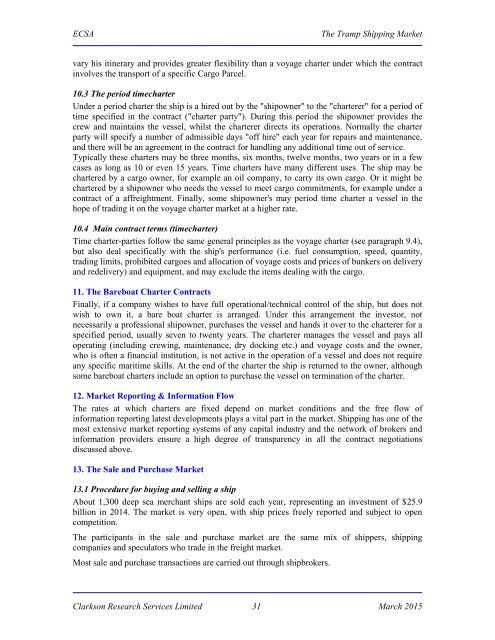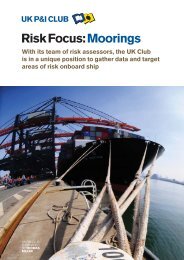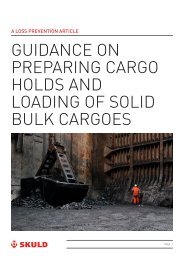You also want an ePaper? Increase the reach of your titles
YUMPU automatically turns print PDFs into web optimized ePapers that Google loves.
<strong>ECSA</strong><br />
<strong>The</strong> <strong>Tramp</strong> <strong>Shipping</strong> <strong><strong>Mar</strong>ket</strong><br />
vary his itinerary and provides greater flexibility than a voyage charter under which the contract<br />
involves the transport of a specific Cargo Parcel.<br />
10.3 <strong>The</strong> period timecharter<br />
Under a period charter the ship is a hired out by the "shipowner" to the "charterer" for a period of<br />
time specified in the contract ("charter party"). During this period the shipowner provides the<br />
crew and maintains the vessel, whilst the charterer directs its operations. Normally the charter<br />
party will specify a number of admissible days "off hire" each year for repairs and maintenance,<br />
and there will be an agreement in the contract for handling any additional time out of service.<br />
Typically these charters may be three months, six months, twelve months, two years or in a few<br />
cases as long as 10 or even 15 years. Time charters have many different uses. <strong>The</strong> ship may be<br />
chartered by a cargo owner, for example an oil company, to carry its own cargo. Or it might be<br />
chartered by a shipowner who needs the vessel to meet cargo commitments, for example under a<br />
contract of a affreightment. Finally, some shipowner's may period time charter a vessel in the<br />
hope of trading it on the voyage charter market at a higher rate.<br />
10.4 Main contract terms (timecharter)<br />
Time charter-parties follow the same general principles as the voyage charter (see paragraph 9.4),<br />
but also deal specifically with the ship's performance (i.e. fuel consumption, speed, quantity,<br />
trading limits, prohibited cargoes and allocation of voyage costs and prices of bunkers on delivery<br />
and redelivery) and equipment, and may exclude the items dealing with the cargo.<br />
11. <strong>The</strong> Bareboat Charter Contracts<br />
Finally, if a company wishes to have full operational/technical control of the ship, but does not<br />
wish to own it, a bare boat charter is arranged. Under this arrangement the investor, not<br />
necessarily a professional shipowner, purchases the vessel and hands it over to the charterer for a<br />
specified period, usually seven to twenty years. <strong>The</strong> charterer manages the vessel and pays all<br />
operating (including crewing, maintenance, dry docking etc.) and voyage costs and the owner,<br />
who is often a financial institution, is not active in the operation of a vessel and does not require<br />
any specific maritime skills. At the end of the charter the ship is returned to the owner, although<br />
some bareboat charters include an option to purchase the vessel on termination of the charter.<br />
12. <strong><strong>Mar</strong>ket</strong> Reporting & Information Flow<br />
<strong>The</strong> rates at which charters are fixed depend on market conditions and the free flow of<br />
information reporting latest developments plays a vital part in the market. <strong>Shipping</strong> has one of the<br />
most extensive market reporting systems of any capital industry and the network of brokers and<br />
information providers ensure a high degree of transparency in all the contract negotiations<br />
discussed above.<br />
13. <strong>The</strong> Sale and Purchase <strong><strong>Mar</strong>ket</strong><br />
13.1 Procedure for buying and selling a ship<br />
About 1,300 deep sea merchant ships are sold each year, representing an investment of $25.9<br />
billion in 2014. <strong>The</strong> market is very open, with ship prices freely reported and subject to open<br />
competition.<br />
<strong>The</strong> participants in the sale and purchase market are the same mix of shippers, shipping<br />
companies and speculators who trade in the freight market.<br />
Most sale and purchase transactions are carried out through shipbrokers.<br />
Clarkson Research Services Limited 31 <strong>Mar</strong>ch <strong>2015</strong>




